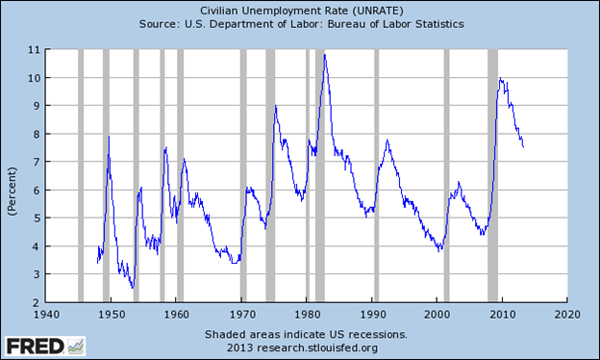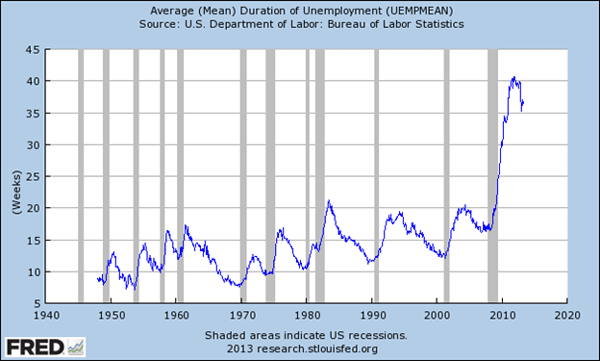U.S. Jobs Crisis - Skills, Education, and Employment
Economics / Employment May 13, 2013 - 03:47 PM GMTBy: John_Mauldin
 "The large shortfall of employment relative to its maximum level has imposed huge burdens on all too many American households and represents a substantial social cost. In addition, prolonged economic weakness could harm the economy's productive potential for years to come. The long-term unemployed can see their skills erode, making these workers less attractive to employers. If these jobless workers were to become less employable, the natural rate of unemployment might rise or, to the extent that they leave the labor force, we could see a persistently lower rate of labor force participation." - Janet L. Yellen, Vice-Chair, US Federal Reserve, March 4, 2013
"The large shortfall of employment relative to its maximum level has imposed huge burdens on all too many American households and represents a substantial social cost. In addition, prolonged economic weakness could harm the economy's productive potential for years to come. The long-term unemployed can see their skills erode, making these workers less attractive to employers. If these jobless workers were to become less employable, the natural rate of unemployment might rise or, to the extent that they leave the labor force, we could see a persistently lower rate of labor force participation." - Janet L. Yellen, Vice-Chair, US Federal Reserve, March 4, 2013
It is graduation time, and this morning finds me swimming in a sea of fresh young faces as a young friend graduates, along with a thousand classmates. But to what? I concluded my final formal education efforts in late 1974, in the midst of a stagflationary recession, so it was not the best of times to be looking for work. It turned out that I had a far different future ahead of me than I envisioned then. But I would trade places with any of those kids who graduated today, as my vision of the next 40 years is actually very optimistic. With all the advances in healthcare, technology, and communications that have come and will come, they will get to embrace a world full of opportunity; and yet, this generation is starting out with more than just a minor economic handicap.
This week's letter will explore changes in the work marketplace, changes that generated quite a lot of discussion at last week's Strategic Investment Conference. At the end of the letter I will also provide a link for qualified investors to listen in on a webinar conversation between Kyle Bass and me on another of the main topics last week: Japan. This is one you'll want to tune in to. (Warning: this letter will read fast but print long, as there are more than the usual number of charts and graphs, though the word count is actually shorter than usual.)
And a quick note up front on Japan. As of the last two weeks, Japanese investors are now net buyers of foreign bonds, and the yen has broken through 100 to the dollar. I think what is happening in Japan is going to be the nexus of a global flow of cash that will be unlike any we have ever seen. Attention MUST be paid. It is windshield time.
David Rosenberg: A Bond Bull Turns Bearish
How do we get to full employment and improved national education from the launching point of David Rosenberg's very recent call (at the conference and elsewhere) that we will soon see inflation and the onset of a bond bear market? I must say that he surprised a few of us with his conversion from bond bull to bond bear. But the reason why he converted surprised us even more. I am not going to be able to do justice to his impeccably reasoned, highly detailed presentation in this short space, but let me hit some highlights.
Specifically, Rosie thinks that the Fed is going to be surprised by wage-push inflation. How could we see inflation in wages in such a soft labor market? That was the first question in my mind, and the following charts give me some reasons for my question.
The present unemployment rate is still higher than at any time in the last 60 years, except after recessions. The Great Recession ended four years ago, and unemployment is still stubbornly high. Indeed, this is the slowest "jobs recovery" we have ever experienced. The current level of unemployment has never been seen four years after the end of a recession.

And those who lose their jobs are staying unemployed longer. The fact is that the mean duration of unemployment is still almost double what it has ever been. Average length of unemployment is 37 weeks. When the recession ended, it stood at 23 weeks. This is structural, not frictional, unemployment. Ninety million American adults now subsist outside the official labor force –It could be there's an underground economy that we need to capture. The pool of available labor for the business sector is shrinking 2% per year.

Worse yet, the unemployment rate is still stubbornly high in spite of an unprecedented rise in the number of people who are no longer counted as being in the labor force. These are people who are no longer looking for jobs.We are back to workforce participation levels not seen since the 1970s. A good 5% of US citizens who are able to work are no longer are looking for work. Part of this trend is due to alternatives to employment becoming easier to pursue. Millions have been added to the disability rolls – some 4 million since the beginning of this century and almost 2 million since the beginning of the Great Recession (and still rising at an alarming rate!). Others have gone back to school, borrowing money in the form of student loans, which have topped over $1 trillion and are the only form of consumer credit that has been on the increase.
As a quick aside, we are also seeing skyrocketing rates of late payments as student loans overwhelm the ability of borrowers to pay. This is a true crisis brewing, as student loans are the only type of debt that cannot be discharged in bankruptcy. Student loans can make you an indentured servant for a very long time.
Some would-be workers find that in some states they can collect more on government assistance than they can earn by working lower-wage jobs, and thus they have no economic incentive to look for jobs that would actually lower their income. As I wrote in a recent letter, this is why we are seeing a large rise in non-reported incomes and jobs. And finally, there are those who are just discouraged. Jobs seemingly do not exist for their skill sets and in places where they can access them.
To continue reading this article from Thoughts from the Frontline – a free weekly publication by John Mauldin, renowned financial expert, best-selling author, and Chairman of Mauldin Economics – please click here.
John Mauldin
subscribers@MauldinEconomics.com
Outside the Box is a free weekly economic e-letter by best-selling author and renowned financial expert, John Mauldin. You can learn more and get your free subscription by visiting www.JohnMauldin.com.
Please write to johnmauldin@2000wave.com to inform us of any reproductions, including when and where copy will be reproduced. You must keep the letter intact, from introduction to disclaimers. If you would like to quote brief portions only, please reference www.JohnMauldin.com.
John Mauldin, Best-Selling author and recognized financial expert, is also editor of the free Thoughts From the Frontline that goes to over 1 million readers each week. For more information on John or his FREE weekly economic letter go to: http://www.frontlinethoughts.com/
To subscribe to John Mauldin's E-Letter please click here:http://www.frontlinethoughts.com/subscribe.asp
Copyright 2013 John Mauldin. All Rights Reserved
Note: John Mauldin is the President of Millennium Wave Advisors, LLC (MWA), which is an investment advisory firm registered with multiple states. John Mauldin is a registered representative of Millennium Wave Securities, LLC, (MWS), an FINRA registered broker-dealer. MWS is also a Commodity Pool Operator (CPO) and a Commodity Trading Advisor (CTA) registered with the CFTC, as well as an Introducing Broker (IB). Millennium Wave Investments is a dba of MWA LLC and MWS LLC. Millennium Wave Investments cooperates in the consulting on and marketing of private investment offerings with other independent firms such as Altegris Investments; Absolute Return Partners, LLP; Plexus Asset Management; Fynn Capital; and Nicola Wealth Management. Funds recommended by Mauldin may pay a portion of their fees to these independent firms, who will share 1/3 of those fees with MWS and thus with Mauldin. Any views expressed herein are provided for information purposes only and should not be construed in any way as an offer, an endorsement, or inducement to invest with any CTA, fund, or program mentioned here or elsewhere. Before seeking any advisor's services or making an investment in a fund, investors must read and examine thoroughly the respective disclosure document or offering memorandum. Since these firms and Mauldin receive fees from the funds they recommend/market, they only recommend/market products with which they have been able to negotiate fee arrangements.
Opinions expressed in these reports may change without prior notice. John Mauldin and/or the staffs at Millennium Wave Advisors, LLC and InvestorsInsight Publishing, Inc. ("InvestorsInsight") may or may not have investments in any funds cited above.
Disclaimer PAST RESULTS ARE NOT INDICATIVE OF FUTURE RESULTS. THERE IS RISK OF LOSS AS WELL AS THE OPPORTUNITY FOR GAIN WHEN INVESTING IN MANAGED FUNDS. WHEN CONSIDERING ALTERNATIVE INVESTMENTS, INCLUDING HEDGE FUNDS, YOU SHOULD CONSIDER VARIOUS RISKS INCLUDING THE FACT THAT SOME PRODUCTS: OFTEN ENGAGE IN LEVERAGING AND OTHER SPECULATIVE INVESTMENT PRACTICES THAT MAY INCREASE THE RISK OF INVESTMENT LOSS, CAN BE ILLIQUID, ARE NOT REQUIRED TO PROVIDE PERIODIC PRICING OR VALUATION INFORMATION TO INVESTORS, MAY INVOLVE COMPLEX TAX STRUCTURES AND DELAYS IN DISTRIBUTING IMPORTANT TAX INFORMATION, ARE NOT SUBJECT TO THE SAME REGULATORY REQUIREMENTS AS MUTUAL FUNDS, OFTEN CHARGE HIGH FEES, AND IN MANY CASES THE UNDERLYING INVESTMENTS ARE NOT TRANSPARENT AND ARE KNOWN ONLY TO THE INVESTMENT MANAGER.
John Mauldin Archive |
© 2005-2022 http://www.MarketOracle.co.uk - The Market Oracle is a FREE Daily Financial Markets Analysis & Forecasting online publication.



